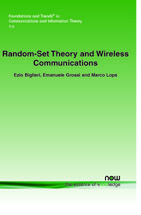Random-Set Theory and Wireless Communications
By Ezio Biglieri, UPF, Barcelona, Spain and King Saud University, KSA, e.biglieri@ieee.org | Emanuele Grossi, UNICAS, DIEI, Italy, e.grossi@unicas.it | Marco Lops, UNICAS, DIEI, Italy, lops@unicas.it
Abstract
This monograph is devoted to random-set theory, which allows unordered collections of random elements, drawn from an arbitrary space, to be handled. After illustrating its foundations, we focus on Random Finite Sets, i.e., unordered collections of random cardinality of points from an arbitrary space, and show how this theory can be applied to a number of problems arising in wireless communication systems. Three of these problems are: (1) neighbor discovery in wireless networks, (2) multiuser detection in which the number of active users is unknown and time-varying, and (3) estimation of multipath channels where the number of paths is not known a priori and which are possibly time-varying. Standard solutions to these problems are intrinsically suboptimum as they proceed either by assuming a fixed number of vector components, or by first estimating this number and then the values taken on by the components. It is shown how random-set theory provides optimum solutions to all these problems. The complexity issue is also examined, and suboptimum solutions are presented and discussed.
Random-Set Theory and Wireless Communications
Random-Set Theory and Wireless Communications gives a concise and accessible treatment of this mathematical technique and its application to wireless communications, concentrating on estimation problems where the quantities to be estimated are in a random number.
This monograph takes an engineering approach to the topic in which the theories of the most important techniques are explained in detail before showing how they are applied specifically to two problems in wireless communications. The first half of the monograph introduces the theory of Random Sets. In particular Random Finite Sets (RFS), Probability Hypothesis Density (PHD) filtering, and its "Cardinalized" form (CPHD) are described in detail. Topics covered along the way include the definition of RFS probability density functions (pdfs), with extensions such as Bayesian recursions, statistical Inference, and implementing reduced-complexity RFS estimators. The second half of Random-Set Theory and Wireless Communications illustrates the application of RFS theory to two relevant problems of Communication Theory: multiuser detection and channel estimation in dynamic environments.
Random-Set Theory and Wireless Communications is an important and comprehensive survey of how to use Random Set Theory in the design of future wireless communication systems.
